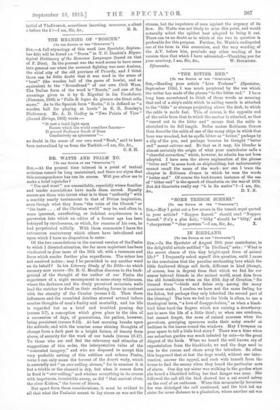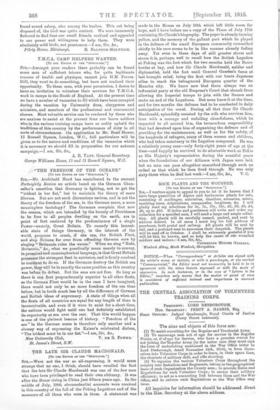IN BIRDLAND.
[To Taz EDITOR OF THE " snoTerort.'l
Sin,—In the spectator of August 28th your contributor, in the delightful article entitled " In Birdland," asks : " What is the secret charm of this tiny bright-eyed form of animal life P" I frequently asked myself this question, until I came to the conclusion that the peculiar enchanting love which the little feathered things call forth, different in kind (though, of course, less in degree) from that which we feel for our nearer beloved friends in the animal world, must date from the old benediction when on the fifth day of Creation " lie blessed them "—birds and fishes only among the many creatures made. I confess we have not the same feeling for the fishes, but perhaps they only inherited the second part of the blessing! The love we feel to the birds is often, to use a theological term, " a love of disapprobation," as when a black- bird bites hard the fingers which are ruining a strawberry- net to save the life of a little thief ; or when one condones, but cannot forget, the rows of ruined crocuses when the garrulous, gossiping sparrows make their noisy couch(' at bedtime in the leaves round the windows. May I trespass on your space to tell a little bird story P There was a time when our suburban garden was much infested by cats—to the great disgust of the birds. When we heard the well-known cry of expostulation from the blackbirds, we and the dogs used to run to the rescue and chase away the intruders. So often this happened that at last the dogs would, without our inter- vention, answer the appeal, and rush with tumult from the house to find the enemy when they heard the particular note of alarm. One day my sister was walking in the garden when she heard a blackbird telling her that danger was near. She followed the call till the bird showed her a cat sound asleep on the roof of an outhouse. When this momentarily harmless foe was dislodged the call continued, and the bird led my sister for some distance to a plantation, where another oat was
found sound asleep, also among the bushes. This cat being disposed of, the bird was quite content. We were immensely flattered to find that our small friends realized and appealed to our power and willingness to help them. They were absolutely wild birds, not pensioners.—I am, Sir, &o.,



































 Previous page
Previous page